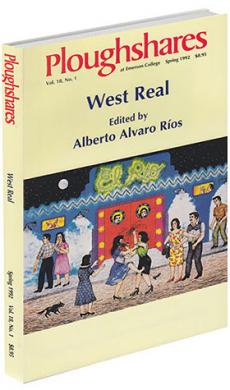rev. of Rapture by Susan Mitchell
A given of Elizabethan thought — expressed in works as different as Hooker's
Laws of Ecclesiastical Polity and Shakespeare's
Antony and Cleopatra — was God's goodness as made manifest through the "infinite variety," to use Enobarbus's phrase, of his creation. Susan Mitchell's Rapture, her second collection, is an extended hymn in praise of our world's abundance, or, in the current term, its multiplicity.
Mitchell, author of a volume published in 1983,
The Water Inside the Water, and known to readers of
Ploughshares as a 1991 Cohen Award winner, writes poems that read like richly embroidered verbal tapestries, with one narrative woven into another and then into another through the grace of a lyrical moment that allows her to perceive connecting threads where none had seemed visible before. In "A Story," for example, memories of two bars, one in Chicago and one in New York, and of a stabbing that took place in the former, are joined in the poem's coda by the speaker's revelation of a blood transfusion she received when nineteen, and her body's adverse reaction to it. "For you," Mitchell concludes, "who raised a rash on my arms / and made my body shiver for days, listen, / whoever you are, this poem is for you."
What the speaker of "A Story" experiences in her body, the violent collision of two opposing forces, is the joyous source of polyphonic song in these ambiguously original poems, whether those forces appear as literary ("Night Music"), geographical ("Cities"), social ("Havana Birth"), or personal ("Self Portrait With Two Faces"). Life in the 1990s may appear to be as fragmented and as pocked with lacunae as the subject of "Mosaic, Probably Narcissus"; it may appear to sound "like gibberish," as
Rapture's title poem states. But when we have as guide and interpreter Susan Mitchell, a latterday Orpheus who knows how to sing from such varied fragments rather than bemoaning them, an unforgettable poetry is the result.

